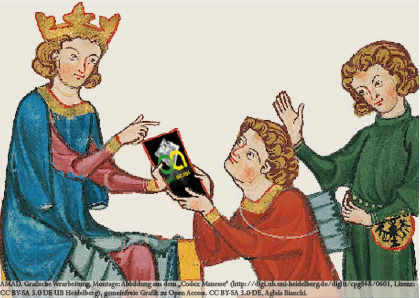AMAD
„Archivum Medii Aevi Digitale - Interdisziplinäres Open-Access-Fachrepositorium und Wissenschaftsblog für Mittelalterforschung‟Zur Einreichung

| Datum: | 2017 |
| Titel: | Dominio cultural de España y Portugal en la Europa renacentista. Las expediciones navales y la hegemonía de la Península Ibérica en el conocimiento de las “herbes” ; Cultural domination of Spain and Portugal in Renaissance Europe. Naval expeditions and the hegemony of the Iberian Peninsula in the knowledge of "herbs" |
| Mitwirkende: | Universidad de Oviedo Universidad Autónoma de México |
| Autor*in: | Sánchez Canteli, Mario Neri Vela, Rolando Sánchez Fernández, Luis Vicente Argüelles Luis, Juan |
| Beschreibung: | Cuando Vesalio introdujo sus manos en los cadáveres para quebrantar el pensamiento galénico, cuando la teoría geocéntrica aristotélica-ptolemaica se resentía en pos de la heliocéntrica, cuando los seres humanos estaban rompiendo ataduras del mundo clásico para establecer una “observatio” libre las naves de la Península Ibérica partían y atracaban sin cesar desde Sevilla o Lisboa y mantenían una actividad frenética aportando nuevas pruebas para construir un mundo mejor. Las ideas erasmistas diseminaban la piedad católica por el mundo y España y Portugal estaban aportando al renacimiento un saber científico-humanista con la exploración de mundos desconocidos. El panorama ofrecido por América y Asia abrió un novedoso impulso a las parcelas del conocimiento. La aportación más importante corresponde a la terapia farmacológica tras la publicación de “Historia medicinal.” del español Nicolás Monardes y de “Colóquios dos simples.” del portugués García da Orta. ; When Vesalius introduced his own hands into corpses to break Galenian thinking, when the Aristotelian-Ptolemaic geocentric theory suffered moving forward the heliocentric theory, when humans were breaking bonds of the classical world to establish a free "observatio" the ships of The Iberian Peninsula left and docked incessantly from Seville or Lisbon and maintained an hectic activity providing new evidence to build a better world. Erasmus philosophy spread Catholic piety throughout the world, and Spain and Portugal were bringing to the Renaissance a scientific-humanist knowledge with the exploration of unknown worlds. The panorama offered by America and Asia opened a new impulse to the areas of knowledge. The most important contribution corresponds to the pharmacological therapy after the publication of “Historia medicinal.” of the Spaniard Nicolás Monardes and “Colóquios dos simples.” of the Portuguese García da Orta. ; peerReviewed |
| URI: | https://www.amad.org/jspui/handle/123456789/64763 |
| Quelle: | http://hdl.handle.net/10662/8166 |
| AMAD ID: | 694161 |
| Enthalten in den Sammlungen: | BASE (Bielefeld Academic Search Engine) General history of Europe |

